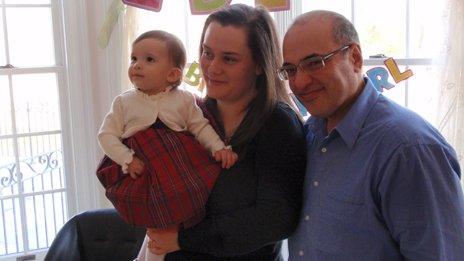'I wish IVF had never been invented'
- Published

A recent Magazine article by Lisa Jardine about the frequency with which In Vitro Fertilisation (IVF) fails prompted readers to send in their own experiences.
Five million babies have been born worldwide since 1978 thanks to IVF. But few people talk of the many more times the treatment doesn't work, said Lisa Jardine, the departing chair of the Human Fertilisation and Embryology Authority (HFEA), in the article.
Fertility problems are estimated to affect one in six or one in seven couples in the UK - approximately 3.5 million people .
Around 60,000 fertility treatments are performed in UK licensed clinics per year, with the live birth rate after IVF about a quarter, according to latest figures (2010) from the HFEA.
The latest HFEA figures show that for every cycle of IVF, fewer than a third of patients under the age of the 35 will be successful. And the percentages decrease as women get older.
Moreover, costs are high - 60% of IVF treatment in Britain is carried out in private clinics
Here are some of our readers' experiences with IVF.
Karen, Blackpool: I knew about my fertility issue as a teen and met my husband when I was 31 and living and working in France. We put our names down on the waiting list as soon as we could at a French hospital. As I had contributed to the French social security system, we did not have to pay for the treatment. However, we did have to wait four years and I was therefore 36 when I started treatment, by which time we had returned to the UK.
Four donor embryos and nothing but empty arms. This treatment gave us nothing but false hope when we could have spent energy on other things at an earlier stage. Of course, you only get to hear the success stories.
Thurstan, Farnborough: My wife and I are going through our second round of IVF after the first one didn't work. We got through to the very end successfully, but the final result did not happen. We have to pay for our treatment, yet if we lived five miles in a different direction we would have got it free. We are told the success rate - for us its 25% to 30% - and you do live on hope. It is absolutely crushing to find out it has not worked and nobody can tell you why. Another £6,000 down the drain and you are left with a devastated feeling.

Joanna was successful on her third attempt
Joanna, UK: At 27 I was diagnosed with Turner syndrome, and then with signs of premature ovarian failure - with a three-year time limit for most women with my condition.
The technology used in assisted reproductive techniques is ever changing. If we were to wait even just a year, our chances of success would potentially increase. But waiting wasn't an option for us. Without a crystal ball to see how technology will evolve, you're forced into an emotional "now or never" scenario.
The first thing we did as a couple was to decide how many IVF attempts to make. We agreed three - the first ending in yet another miscarriage, the second ending in no viable embryos.
The second round was by far the worst outcome. Sitting in the clinic car park having arrived a little early, we got a phone call telling us not to come in for what was our embryo transfer appointment, because there was nothing to transfer. No viable embryo. We didn't have the energy to go in for the testing results, we just went home. Even now, putting that into words is horribly difficult and not without pain.
Awash with the IVF drugs, which are hormonally altering, you just can't trust yourself to be at your best to make major life decisions. A game plan becomes a must. Had we not decided upon a game plan, I think we would have become addicted to IVF and its offering of hope. Having a game plan was also necessary to make sure we were on the same page. It's a strain within a marriage, but we were fortunate.
It's really a gamble.
We've all heard the expression "that floored me'". The phone call that caused my knees to buckle, I crumpled in a heap of disbelief and tearful, shaking joy. That's the hope people are offered.
J, Cumbria: I'm just about to start my second round of IVF, and as mad as it sounds I wish it wasn't available/invented. It gives you hope and you pray you are one of the lucky ones. It feels like a raffle - how many tickets do you buy?
Gemma, Liverpool: At 29, having found out my fallopian tubes were blocked, I started IVF treatment only for it to result in a failure. We had been trying for nearly three years with one miscarriage, devastation and despair to show for it.
It felt like we had to wait ages for the referral to the fertility centre, but in reality it was only about three months as I'd had a confirmed diagnosis. We were informed that despite the National Institute for Health and Clinical Excellence (NICE) stating that we should have three rounds of IVF, our primary care trust only funded two cycles. Straight away you feel under incredible pressure for it to work, as IVF can cost thousands of pounds at a private clinic - there is the worry of where you'd find the money (I work in the NHS, while my husband is a teacher).
Arranging time off work, the endless appointments and the invasive treatment you go through in the hope that you'll get your dreamed for family out of it. It gave us hope that despite there being an issue with me, we might be able to have a family.
Out of nine eggs, we only got four which fertilised normally, one was transferred and one was frozen.
After the dread of a two-week wait, we found out that it was unsuccessful. I'd joined a support group and other women were announcing that their treatment was successful. It's horrible feeling guilty that you wish it was you experiencing joy rather than that woman, although you're so pleased they've been successful.
We waited for months for a follow-up appointment, and it was decided that an operation was now my best option, with the possibility of removing my tubes - a scary prospect for any woman, but even worse when you know that's it - take them away and you've literally got no chance of falling pregnant naturally. Add in an extra wait for my operation, and by the time it came round I was a wreck.
Amazingly, I didn't have to have my tubes removed. We were given the further hope that we might be able to conceive naturally, but if it didn't occur within a few months, there was still the frozen embryo.
Imagine our surprise when four weeks after my operation my period was late.
I'm now six months pregnant, and I still can't believe it, it still feels like a dream.

Donna, UK: Several years ago, my husband and I embarked on consultations and investigations, then minor operations and IVF to be able to conceive. We had no choice but to go privately - at 34, I was the wrong age to get IVF on the NHS in our area. Having had the initial consultations and started a course of treatment we were told that IVF was not going to help us at all. In a way, we were lucky as our clinic was honest with us and did not try to "sell" us any more treatments or give us false hope - we had only spent £500. This enabled us to cope with the "loss" more easily at this early stage. Our expectations were well managed by our clinic, although I understand that this is not always the case. We have since gone on to adopt a beautiful boy who has made our family complete for the past three and a half years. I hated the invasive nature of IVF, and although I am glad we tried, I would never turn back the clock. We are financially secure now and would have had no savings for a rainy day if we had continued down the route of IVF.
Beth, Sussex: Having been through IVF four times, I can honestly say that all these clinics are after is your money. I've never received a phone call or letter after a failed cycle. In fact, the last clinic in Brighton thought we had miscarried but my twins are now six months old. The clinic made no effort to contact us. It's shocking.
Zoe, Bristol: I honestly believe that undergoing fertility treatment was the worst decision I have ever made. Before, I couldn't get pregnant because of a combined problem - I have polycystic ovaries and my husband has blocked tubes as a direct result of surgery as a baby - it was nobody's fault. I was 27 when we were referred, 28 when we first went to the clinic and 34 when we had treatment on the NHS. I was offered treatment again when I was 37, but couldn't go through with it. We needed a sperm donor just at the time the law changed on donor anonymity and the sperm banks ran dry - literally! I wrote letters and lobbied everyone we could think of to get treatment (at the time, there was no sperm for private patients either) and after two years our clinic managed to secure us sperm for three attempts.
They all failed and in hindsight, I now know they had very little chance of success - funding meant we were offered a less superior form of treatment (and consequently a lower success rate - just 8%) and the clinic also made mistakes with our treatment regime. The pressure to go private was huge because the clinic couldn't offer the treatment we needed - they felt that the best option for us was private treatment and made this clear from the outset, but we couldn't afford it. At the age of 37, I discovered the clinic was able to offer ICSI (intra-cytoplasmic sperm injection) on the NHS, but I no longer met the criteria as my BMI was above 30. (If we had been private patients, BMI wouldn't have mattered). We were told from the outset about the failure rate and at every subsequent appointment. At times it felt that the clinic was only focused on the failure rate. The clinic counsellor only wanted to talk about failure which I felt was inappropriate in the middle of a cycle, whereas if I mentioned failure to the nursing staff, they always brushed it under the carpet, encouraging positive thinking instead. There was a lot of conflicting information - they would be happy to ram failure rates down your throat, but if you mentioned it, it was often glossed over. In the reception area there was a photo board of babies belonging to all the families who had had successful treatment - there was no mention of the other side. They didn't like it if I cried either - I was once told off for "snivelling" by one of the doctors.
Undergoing treatment was difficult, but coming to terms with failure was much harder. Now the failure to get pregnant was purely my fault, something the clinic was very keen to reinforce - I was overweight, I had produced too many eggs, I hadn't taken my drugs correctly. Three times my body was fooled into thinking I was pregnant when no baby existed and I feel like I've had multiple miscarriages, except I haven't. I feel like I've lost a child, except I haven't. When people ask me about the worst part of infertility, I tell them it's the silence - they take that to mean that nobody talks about it and that is partly true, but for me, it's the silence which comes from the isolation and the lost friends who have moved on and had children. I no longer have anything in common with my peers. My mother-in-law recently told me that life goes on and it does go on around me, but life also stops with me - where there are no children, there are no grandchildren, no-one to care in later life, no legacy and that is silence which terrifies me.
Fred, Whitby: There are unacceptable variations in the success rates of IVF. Living in one of the few areas of the country where IVF is not available on the NHS, we were forced to go private. Our options ranged from 17% at one local hospital, to 65% in a London clinic. We weighed up the options and, despite the significant extra cost and inconvenience, went for the London clinic. We knew we could only afford one cycle, but also that we didn't want to keep trying and failing. The difference was that it was in their interests to make sure everything was perfect before going ahead with the various procedures, as their success rates are their best advertisement. The local hospitals seem happy to press ahead, even when the body is not in its best condition to accept an embryo. Happily, we now have an amazing little boy.
Karen, Cambridge: My husband and I went through five unsuccessful IVF treatments, and I have to say this was the worst period of my life. The drugs make you feel awful, it costs a fortune and the grief is overwhelming. All this happens in private, too, trying to carry on like nothing is happening. I went through an NHS hospital and two private hospitals and found very little compassion - we were just on a conveyor belt. We were told it was just "unexplained", but if we had been advised on more tests that were available earlier, we may have found a solution before it was too late. No doubt you will receive lots of nasty comments from people saying we should just adopt, or there are too many people in the world anyway - these usually come from people who haven't had to face that decision themselves and haven't really thought about what it means. Changes in the adoption process are, however, starting to make that a more viable option.
Diane, York: I think it's quite naive to think that couples who embark on IVF don't know the odds of success. By the time they reach the decision of going down this route, they already know their chances are low. My husband and I certainly did. However, for us, it was a case of not looking back in 30 to 40 years' time, and saying that we wished we had at least tried. We were lucky, we are very proud parents of a lovely little boy at our third attempt, and we don't regret what we went through for one moment.
Follow @BBCNewsMagazine, external on Twitter and on Facebook, external